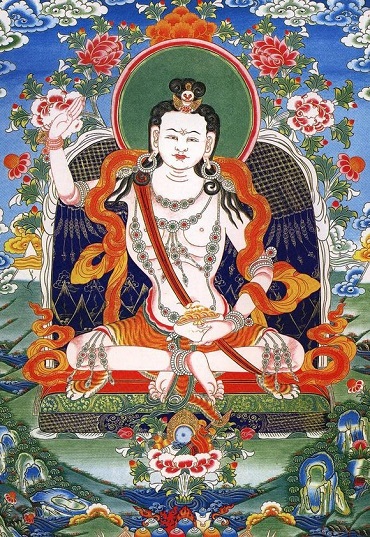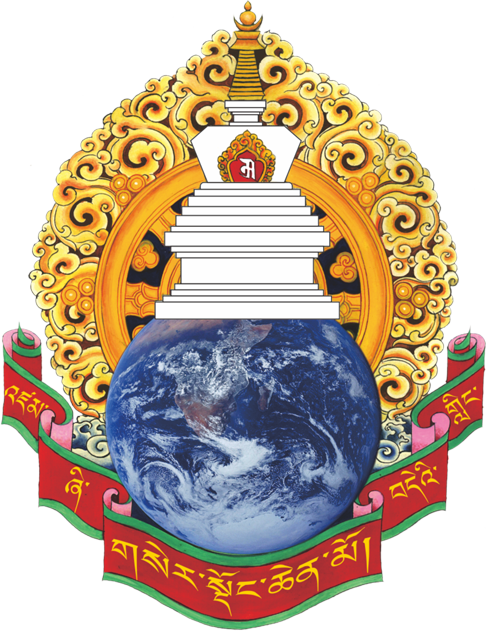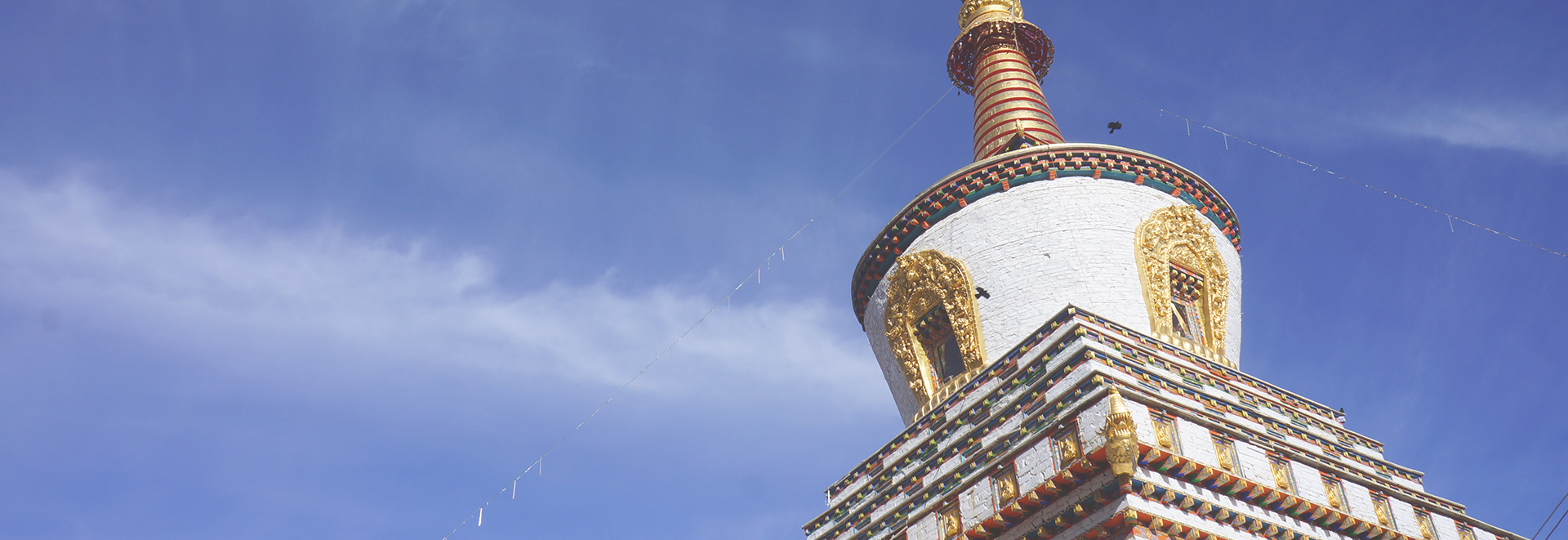Longchen Nyingtig Lineage
LINEAGE

JÑĀNASŪTRA (Ye Shes mDo) was born in the eastern city of Kamalashīla in eastern India. His father was Shāntihasta (Hand of Peace), and his mother was Kalyāṇachitta (Virtuous Minded), in a shūdra (lowest-caste) family. He became learned and went to Bodhgayā, where he lived with five hundred scholars. Among them was Vimalamitra, with whom his relations were very close because of their previous lives.
One day Jñānasūtra and Vimalamitra walked about two miles to the west of Bodhgayā. At that time, from the sky Vajrasattva Buddha appeared and proclaimed, “O sons of good family, you have each taken birth five hundred times as scholars, yet you have not attained Buddha-hood. If you would like to attain the enlightenment of the dissolving of the defiled body in this very lifetime, go to the temple near the Bodhi Tree in China.”
Vimalamitra went to China, received the oral transmissions of theOuter, Inner, and Esoteric cycles, and returned to India. He and Jñānasūtra met again on the outskirts of the city of Gache Kyi Tsal (Joyful Garden). Vimalamitra told Jñānasūtra about his meeting with the master Shrīsiṃha in China.
Then Jñānasūtra in turn went to China, reaching nine months’ distance in a single day through his miraculous power. When he reached the temple near the Bodhi Tree in China, he met a beautiful girl who was carrying a vase filled with water. She instructed him to go to Tashi Trigo. When he arrived at the giant, magnificent temple, a ḍākinī instructed him to go to Siljin charnel ground. He went there and met the master Shrīsiṃha in person in a temple of skulls. To please the master, he served him for three years. Then with offerings he beseeched him for teachings. Shrīsiṃha taught him the teachings of the oral transmission for nine years. Shrīsiṃha withdrew the hidden texts of these teachings from the temple near the Bodhi Tree and entrusted them to Jñānasūtra.
Then Jñānasūtra was satisfied and prepared to depart. Shrīsiṃha asked him, “Are you satisfied?” Jñānasūtra answered, “Yes, I am satisfied.” “The teachings have not yet been entrusted to you,” said Shrīsiṃha. Jñānasūtra thought, “There may be still more profound teachings,” and he requested Shrīsiṃha to confer them. Shrīsiṃha answered, “It is necessary to have empowerments.” In the temple of Tashi Trigo he gave Jñānasūtra the complete elaborate empowerment, followed by the teachings on Innermost Esoteric cycle for three years. But he did not give him the texts, saying, “The texts will appear for you when the time comes.” Then, in a deserted town, Shrīsiṃha also conferred on him the simple empowerment. When Jñānasūtra finished one year’s training on preparatory exercises on the experiences of saṃsāra and nirvāṇa on the peak of Mount Kosala, Shrīsiṃha conferred on him the very simple empowerment teachings, and an extraordinary confidence was developed in Jñānasūtra. Then, after training for a month, Jñānasūtra was given the utmost simple empowerment, and he realized full control over his mind. Jñānasutra stayed with Shrīsiṃha for sixteen more years, training in meditation and observing the esoteric disciplines of the master. The master kept behaving in mysterious ways, wandering in charnel grounds,transforming himself into various forms, and mingling with ḍākinīs and fearful beings without the slightest timidity.
Then the master was invited by King Paljin (Provider of Glory) of the country of Li and he went there, through the sky, riding a white lion, sitting in a silk tent under three layers of parasols, held up by six powerful young yakṣhas. The morning of the seventh day after his departure, a loud noise was heard in the sky. Jñānasūtra looked in the sky and saw the master seated in the midst of a mass of light. Jñānasūtra realized that the mortal body of the master had dissolved. Jñānasūtra offered prayers, and into his hand fell the testament, Zerbu Dünma (The Seven Nails).
Shrīsiṃha also gave him this prophetic instruction: “The texts of the Inner Esoteric teachings, the Nyingthig, are concealed in a pillar of Tashi Trigo. Take them and go to Bhasing charnel ground.” Then Jñānasūtra withdrew the texts and went to the most beautiful, fearful, and powerful Bhasing charnel ground, which is situated far to the east of Bodhgayā. While Jñānasūtra was staying there performing esoteric exercises and giving teachings to ḍākinīs, Vimalamitra, who was also doing esoteric practices, received a prophecy from a ḍākinī and came to see Jñānasūtra. Jñānasūtra gave him the elaborate, simple, very simple, and utmost simple empowerments and teachings, and he also entrusted him with the texts.
At the end of his life Jñānasūtra attained the dissolution of the mortal body, and when Vimalamitra uttered the prayer of lamentation, Jñānasūtra appeared and conferred on him his testament, Zhakthap Zhipa (The Four Methods of Contemplation). It includes these lines:
Homage to the primordially pure emptiness. . . .
Wonderful! If you train in these, joy will arise naturally.
If you wish to attain the state of great equalness, gain experience [in the following contemplations] all the time.
[a] If you wish to be trained in all the esoteric “activities,”
maintain all the appearances in the directness (Cher) of natural contemplation.
[b] If you wish to gain strength in your “meditation,” remain in the union of mind and matter through the view of oceanlike natural contemplation.
[c] If you wish to attain self-liberation from all the “views” [concepts], bring all the existents to their cessation through the mountainlike natural contemplation.
[d] If you wish to attain all the “results,” as they are, liberate all the errors in the training through the mountainlike view.
*Above Contents from Masters of Meditation and Miracles: Lives of the Great Buddhist Masters of India and Tibet by Tulku Thondup (1999).


